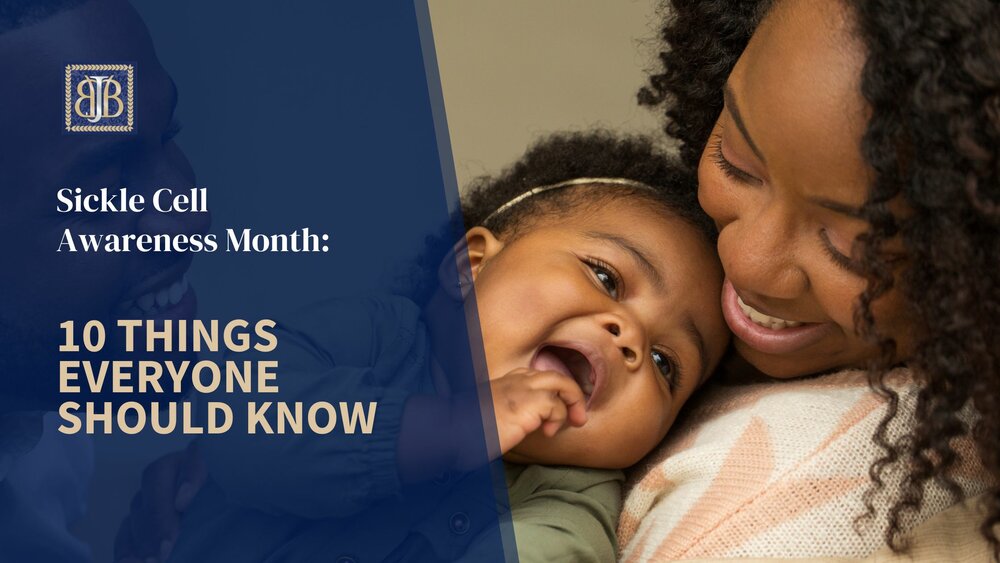Sickle Cell Awareness Month: 10 Things Everyone Should Know
September is Sickle Cell Awareness Month, dedicated to raising awareness about a disease that touches more than 100,000 people in the U.S.
The annual observance is about honoring the strength of families, sharing knowledge, and spreading hope for better care and brighter futures. To mark Sickle Cell Awareness Month, here are ten important things worth knowing and sharing.
1. Sickle cell is one of the most common inherited blood disorders.
Sickle cell disease occurs when a child inherits two sickle cell genes, one from each parent. This causes red blood cells to take on a crescent or “sickle” shape, which can block blood flow and reduce oxygen throughout the body.
2. It disproportionately affects approximately African Americans and other minorities.
Sickle cell disease is not rare. It affects people of all backgrounds, but is more common among African Americans, Hispanic Americans, and people with ancestry from regions such as Africa, the Middle East, and parts of Asia.
3. The risks begin at birth.
Every baby born in the United States is tested for sickle cell disease. About 1 in 365 African American babies and 1 in 16,300 Hispanic American babies are born with the disease. This early screening helps families and doctors start treatment right away.
4. Carriers may not have symptoms.
When a person inherits only one sickle cell gene, they are said to have “sickle cell trait”. They usually don’t have symptoms but can still pass the gene on to their children. If both parents carry the trait, each pregnancy carries a 25% chance of producing a child with sickle cell disease.
5. Living with sickle cell presents daily challenges.
People with sickle cell often live with pain episodes, fatigue, and risks of serious complications such as stroke or organ damage. These health challenges affect school, work, and family life, requiring constant strength and resilience.
6. Life expectancy has improved, but work remains.
Thanks to medical advances and better care, many people with sickle cell are now living into their 40s, 50s, and beyond. However, the disease still shortens life expectancy, highlighting the need for ongoing research and support.
7. Treatments are on the rise.
While there is no universal cure, treatment has come a long way. Options may include medications, blood transfusions, and in some cases, bone marrow transplants. New gene therapies are also being studied and show real promise for the future.
8. Support networks are essential.
Support groups, advocacy organizations, and community events help families navigate the emotional and practical challenges of sickle cell disease. September’s awareness month brings people together and reminds families that they are not alone.
9. Awareness helps fight stigma.
Because sickle cell disease is less widely discussed than other conditions, people living with it often face misunderstandings or even stigma. Awareness efforts educate the public, reduce misinformation, and encourage greater compassion.
10. Everyone can play a role.
Whether it’s donating blood, raising funds for research, sharing information on social media, or simply learning more about the disease, small actions make a big difference. Sickle Cell Awareness Month is the perfect time to get involved.
At Batchelor Brothers & Jones Funeral Services, we are proud to be part of a community that lifts up families in times of both hardship and hope. We provide care in moments of loss and share knowledge that strengthens and unites us all. Sickle Cell Awareness Month reminds us of the importance of understanding, supporting, and standing alongside those affected.
If you’d like more information or resources about sickle cell disease, or ways to support families in our community, we are here for you. Contact our caring professionals anytime to learn more.
About Batchelor Brothers & Jones Funeral Services: A trusted African American-owned funeral and cremation provider, Batchelor Brothers & Jones Funeral Services proudly serves the Philadelphia community with compassion and care. Established in 2025 through the merger of Batchelor Brothers Funeral Services and The Escamillio D. Jones Funeral Home, the firm brings together more than 25 years of combined experience and a shared commitment to honoring lives with dignity. With two convenient locations in North and West Philadelphia, Batchelor Brothers & Jones offers a full range of personalized services—including funerals, cremations, memorials, repast planning, and grief support—delivered with cultural sensitivity and a deep connection to the community. To learn more, visit www.batchelorbrothersjones.com or call 215-549-4700.







Comments